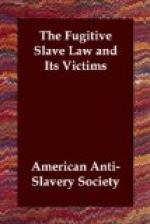BASIL WHITE, Philadelphia, was summarily surrendered into slavery in Maryland, by United States Commissioner Ingraham, June 1, 1853. He was betrayed into the clutches of the kidnapper Alberti, by a colored man named John Dorsey.
Two slaves of Sylvester Singleton, living near Burlington, (Ky.?) escaped and reached Columbus, Ohio; were there overtaken by their master, who secured them and took them back with him.—Cincinnati Enquirer.
JOHN FREEMAN, a free colored man, seized in Indianapolis, and claimed as the slave of Pleasant Ellington, a Methodist church-member, (Summer, 1853,) of Missouri. Freeman pledged himself to prove that he was not the person he was alleged to be. The United States Marshal consented to his having time for this, provided he would go to jail, and pay three dollars a day for a guard to keep him secure! Bonds to any amount, to secure the marshal against loss, if Freeman could go at large, were rejected. Freeman’s counsel went to Georgia, and “after many days returned with a venerable and highly respectable gentleman from Georgia, Mr. Patillo, (post-master of the place where he resides,) who had voluntarily made the long journey for the sole purpose of testifying to his knowledge of Freeman, and that he was well known to be free!” But Freeman was still kept in jail. After several days, Ellington brought witnessess to prove F. to be his slave. The witnesses, and Liston (counsel for Ellington) wished to have Freeman strip himself, to be examined naked. By advise of his counsel he refused. The marshal took him to his cell, and compelled him to strip. The witnesses then swore that he was Ellington’s property. Freeman’s counsel produced further evidence that he had been known as a free man twenty years. Ellington claimed that he had escaped from him sixteen years before. The man who did escape from Ellington, just sixteen years before, was discovered to be living near Malden, Canada. Two of the Kentucky witnesses visited and recognized him. Freeman was then released, but with a large debt upon him, $1,200, which had grown up by the unusually heavy expenses of his defence and long imprisonment, Freeman brought a suit against Ellington for false imprisonment laying damages at $10,000. A verdict for $2,000 was given in his favor, which was agreed to by Ellington’s counsel.—Indiana Free Democrat, May, 1854.
Three slaves, two men and a girl, fled from near Maysville, Kentucky, into Ohio. Were pursued by their owners and assistants, five men armed, and were overtaken, says the Maysville Weekly Express, “at the bridge over Rattlesnake Creek, on the Petersburg and Greenfield road, about ten o’clock at night,” the slaves being, armed, and accompanied by a white man. Both parties fired, the negro girl was wounded, but still fled; one of the negro men was also wounded, and, says the Maysville paper, they “were tracked




